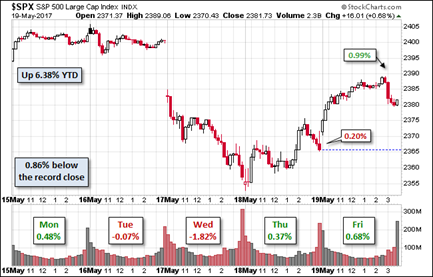We have yet another quiet week for economic reports, and it is in front of a holiday. Don’t worry. Pundits will find something to fill the empty time and space!
It is possible that we will have another week of political stories, but I expect a shift. Many will find it time to digest the recent economic data with a focus on the Fed. I expect many to be asking:
Will the Fed alter its policy path?
Last Week
Last week the economic news was good, but the Wednesday decline dominated. As expected it was all about the political controversies.
Theme Recap
In my last WTWA I predicted that accusations about President Trump would hijack the financial news coverage, including comparisons to Watergate. In my “final thought†(where I put my own opinions) I concluded that the controversy did not represent a downside risk, but there would be concern about the prospects for tax policy. This was one of my most accurate guesses about the week ahead. Those who read it properly – what a big news story really means for their investments – should have found it helpful during the Wednesday selling.
Those who looked only at the story’s (accurate) headline, or interpreted it as political commentary, or think that everyone should ignore potential threats to their pocketbook — these people will not be successful investors. For many, the comments seemed to offer an emotional outlet rather than an investment discussion. The Fear & Greed Trader’s weekly summary captured the essence of the investor problem – the political side show versus fundamentals.
I cannot help readers who would rather discuss politics than investing. As I explained in last week’s introduction, I do not choose the media focus for the week. I merely try to help in coping with it. Here is one of the best analyses – an expert source, reaching my conclusions, but after learning more information.
Let me ask this:Â Would you have been helped more by an investing site that did not even consider the biggest story of the week ahead?
The Story in One Chart
I always start my personal review of the week by looking at this great chart from Doug Short via Jill Mislinski. She notes the news-driven Wednesday decline, the recovery to a modest loss on the week, and the continuing near-record status.

Doug has a special knack for pulling together all the relevant information. His charts save more than a thousand words. Read the entire post for several more charts providing long-term perspective, including the size and frequency of drawdowns.
The News
Each week I break down events into good and bad. Often there is an “ugly†and on rare occasion something very positive. My working definition of “good†has two components. The news must be market friendly and better than expectations. I avoid using my personal preferences in evaluating news – and you should, too.
Once again, the economic news last week was good, but the market reaction was negative. Of course, there were other considerations.
The Good
- Industrial production was up 1%, beating expectations, and up 2.2% year-over-year. Steven Hansen (GEI) reports with a more nuanced viewpoint.
- Philly Fed’s Index registered a blowout 38.8. Steven Hansen (GEI) notes the trends and reminds us of the best methods for interpreting this volatile series.

- Revenue growth. Those complaining about the inaccuracy of earnings growth often turn to revenue. Brian Gilmartin has an important post showing information on this topic, by sector. Not only is growth increasing, so are expectations.
- Home Owner’s Equity is Rising. Marginal Revolution sees balance sheets in “good shape.â€
- Leading indicators rose 0.3%, matching expectations, but reassuring to fans of this method.
- Homebuilder confidence continues the upward trend. Calculated Risk has the story, including this chart:

The Bad
- Brazilian stocks and related ETFs (esp EWZ) plunged on new corruption reports. Ian Bezek has an interesting analysis.
- Building permits declined to 1229K from a prior annualized rate of 1270K. This was also a miss of expectations.
- The yield curve is flattening a bit notes New Deal Democrat in his analysis of high-frequency indicators.
- Housing starts decreased to an annual rate of 1.172 million. Calculated Risk notes that the change was mostly in multi-family, with single family starts up 7% YTD. Bill is maintaining his expectation that starts will increase 3-7% for the year.
The Ugly
North Korea is threatening to retire my “ugly†award. Complicating the problem is a general lack of knowledge on the part of Americans. A lack of information does not stop people from forming an opinion, of course. The Upshot reports that only 36% of Americans can find North Korea on a map. Those who can are more likely to favor diplomacy over military action. Take a try and then check today’s conclusion to compare your choice with that of others.

